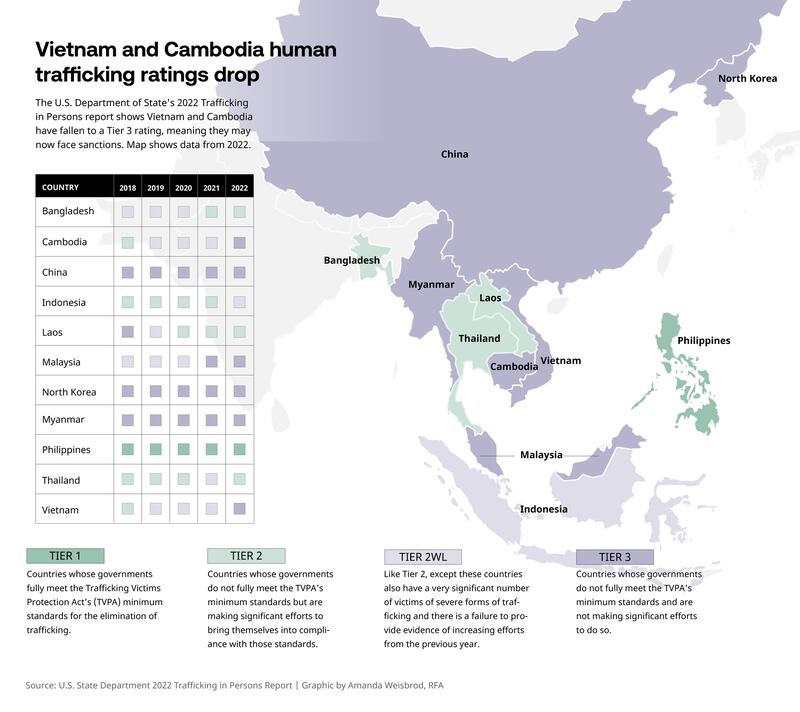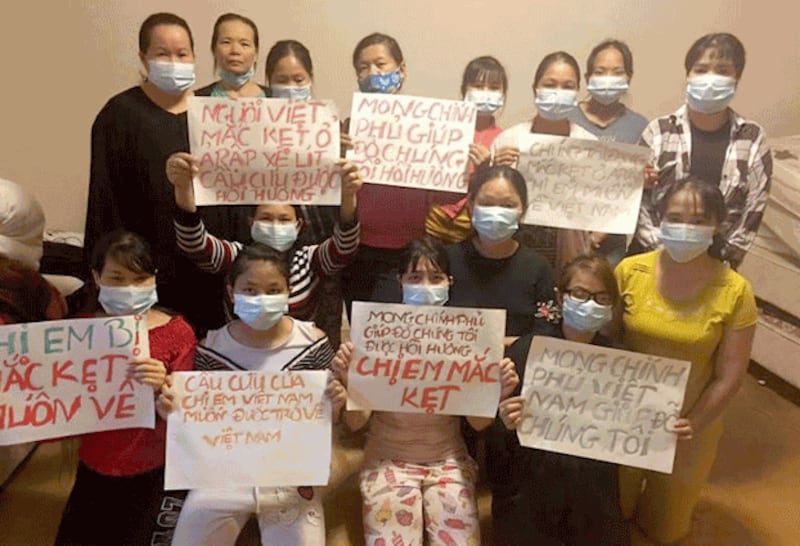Human trafficking worsened in Cambodia and Vietnam over the past year, according to a report issued Tuesday by the U.S. State Department, which placed them in its lowest ranking alongside 20 other countries including China, accused of widespread forced labor and mass incarceration in Xinjiang.
The annual Trafficking in Persons Report, issued on Tuesday, documents human trafficking and efforts to combat it in 188 countries. By falling into Tier 3, Cambodia and Vietnam can face U.S. sanctions unless the State Department grants a waiver.
China remained unchanged at Tier 3, largely on account of its treatment of Uyghurs and other Turkic Muslims in the Xinjiang region and abuses of workers in its massive Belt and Road Initiative of infrastructure projects around the world, the department said.
“I think if you look at the report, you're going to see a mixed picture of progress,” Secretary of State Anthony Blinken said as he presented the report at the State Department in Washington.
Though 21 countries improved in ranking, 18, including Cambodia and Vietnam, fell to lower rankings. A decrease in rank indicates "that they either didn't make significant increasing efforts to combat trafficking or, worse, that their governments have a state sponsored policy or pattern of trafficking,” Blinken said.
The report said that Cambodia and Vietnam governments do “not fully meet the minimum standards for the elimination of trafficking and [are] not making significant efforts to do so, even considering the impact of the COVID-19 pandemic on [their] anti-trafficking capacity.”
In particular, it cited incidents in both countries where diplomats and high-ranking officials were shielded from legal consequences for trafficking due to their official positions.

Although Cambodia took steps to address trafficking — arresting and convicting traffickers, identifying victims, and assisting in repatriation of Cambodian trafficking victims — its efforts were hampered by endemic corruption that made law enforcement ineffective, the report said.
“Authorities did not investigate or hold criminally accountable any officials involved in the large majority of credible reports of complicity, in particular with unscrupulous business owners who subjected thousands of men, women and children throughout the country to human trafficking in entertainment establishments, brick kilns and online scam operations,” the report said.
“The government did not provide adequate protection services for victims domestically or overseas and relied heavily on foreign donors and NGOs to provide much-needed care,” it said.
Vietnam also made an effort to address the problem. Authorities were able to identify more victims than the previous year for the first time in five years. But the government reported a decrease in the convictions of traffickers for the fifth year in a row.
“Authorities again inspected thousands of establishments most-at risk for sex trafficking without identifying any victims of sex trafficking in the process, despite widespread prevalence at such sites,” the report said.
“The government did not hold criminally or administratively accountable two Vietnamese diplomats who were allegedly complicit in subjecting Vietnamese nationals to trafficking abroad during the reporting period, and it did not make sufficient effort to protect the victims in these cases. To the contrary, authorities at times reportedly harassed and pressured survivors and their families in an effort to silence allegations of official complicity,” it said.

Blinken said that the report identified 11 countries where the government trafficked its own citizens, sometimes as a retaliation for political views or for labor on projects of national interest.
“That can look like subjecting people, including children, to forced labor in key sectors … or sending members of ethnic minority groups to be de-radicalized in camps,” he said.
Blinken did not mention China’s Uyghur internment camps in Xinjiang where inmates are reportedly forced to provide labor under the guise of vocational training. But the report said the camps were an important reason why China remained in Tier 3.
“During the reporting period there was a government policy or pattern of widespread forced labor, including through the continued mass arbitrary detention of Uyghurs, ethnic Kazakhs, ethnic Kyrgyz, and members of other Turkic and/or Muslim minority groups in the Xinjiang Uyghur Autonomous Region,” the report said.
Belt and Road Initiative
The report also noted China’s Belt and Road Initiative (BRI), which it called a “a trillion-dollar infrastructure development and economic integration strategy connecting at least 144 countries around the world.”
Chinese nationals and locals in host countries employed in construction, mining and manufacturing around the globe are sometimes subject to “intimidation and threats, physical violence, denial of access to urgent medical care, poor working and living conditions, restricted freedom of movement and communication, and retaliation for reported abuses,” the report said.
The report cited the example of a man from a rural community in China who took a steel production job in Indonesia because it was advertised as high-paying. But when he got to Indonesia, his employers confiscated his passport and told him he would be paid much less than he agreed to even as he had to work longer hours than he expected.
After a few months he was able to sneak away to post pictures of himself online, along with handwritten notes asking for assistance in returning home.
His family saw the posts and contacted Chinese consular services in Indonesia for assistance but they did not help him.
Eventually he and four coworkers saved their money to hire a broker to help them escape the country, but the broker took their money and left them in another China-affiliated industrial park, where they faced similarly harsh conditions.
The workers again saved their money to hire another broker to take them to Malaysia. They were dropped offshore and had to swim to land, all the while being shot at. Once on land, they were arrested by the authorities.
“Stories like this are not uncommon in dozens of BRI countries,” the report said.
It recommended that China create a central governing body for the BRI and make public a full list of all BRI-projects in order to improve oversight to prevent abuse.
The report said that sex trafficking and child forced labor have risen in areas near BRI construction projects.
“The displacement of local communities to make room for BRI projects — often carried out with little or no timely compensation for those who lose their homes — compounds many of these vulnerabilities,” it said.
Laos remained at Tier 2, whereas Hong Kong remained on the Tier 2 watchlist, indicating that although their governments do not meet minimum standards for the elimination of trafficking they are making significant efforts to comply with those standards. North Korea and Myanmar, remained at Tier 3.
The Munich-based World Uyghur Congress (WUC) welcomed the report for mentioning the situation in Xinjiang.
"Today's report released by Sec. Blinken is particularly important in highlighting the trafficking of Uyghurs and forcing them into slave labor by the Chinese authorities,” Dolkun Isa, the WUC’s president told RFA’s Uyghur Service.
“In light of the ongoing genocide and crimes against humanity actively carried out by China in East Turkestan, we urge the U.S.-led Western democracies to take further meaningful actions to stop China's atrocities against the Uyghur people, including the trafficking and forcing Uyghurs into 21st century slavery," he said.
